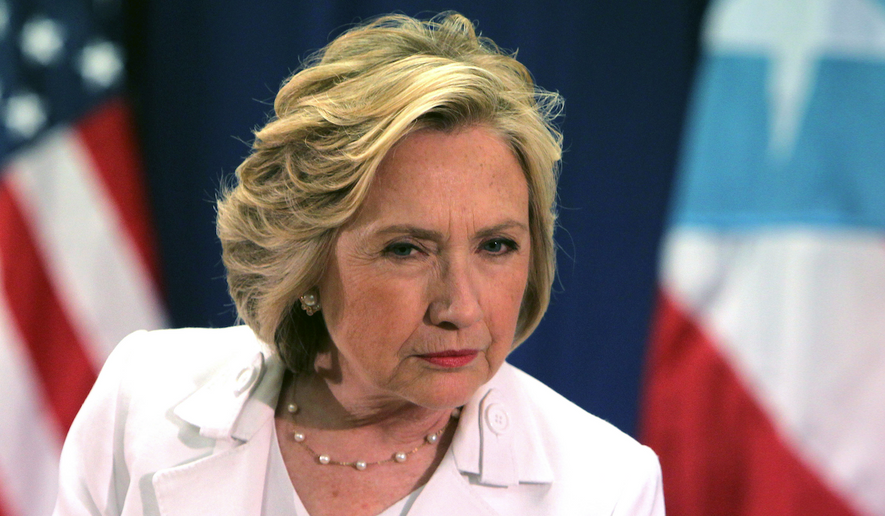A top Republican senator on Monday released an unpublished portion of the infamous Trump-Russia dossier that showed Hillary Clinton associates fed information to the author, former British spy Christopher Steele.
Senate Judiciary Committee Chairmen Charles E. Grassley, Iowa Republican, posted the heavily redacted referral he sent to the Justice Department asking for a criminal investigation into whether Mr. Steele lied to the FBI.
In the referral is a reference to an Oct. 19, 2016, memo Mr. Steele wrote. The referral states that a “foreign sub source is in touch with [name redacted] a friend of the Clintons, who passed it to [name redacted.]”
This Clinton associate was apparently funneling information from the Obama State Department, which passed through an unidentified person first.
The referral, also signed by Sen. Lindsey Graham, South Carolina Republican, states:
“It is troubling enough that the Clinton campaign funded Mr. Steele’s work, but that these Clinton associates were contemporaneously feeding Mr. Steele allegations raises additional concerns about his credibility.”
DOCUMENT: Read the full report detailing the omission of Hillary Clinton from the anti-Trump dossier
It has always been thought that Mr. Steele’s sources were almost exclusively Russian agents. The Oct. 19 Steele memo that mentions ties to the Clintons was not included in the 35-page dossier posted on Jan. 10, 2017, by BuzzFeed.
The FBI used the dossier to obtain a wiretap warrant on a Trump campaign volunteer, Carter Page, a declassified House memo released last week states. The FBI did not tell the court that the Hillary Clinton camp and the Democratic National Committee funded the dossier through Fusion GPS to Mr. Steele.
The memo, released by Rep. Devin Nunes, California Republican and chairman of the House Permanent Select Committee on Intelligence, said the FBI authorized payments to Mr. Steele to continue investigating Mr. Trump.
But the FBI fired him, the memo said, for lying to agents about his contacts with the media. Apparently he told agents he did not brief the press when in fact he talked to a number of Washington reporters in September and October in an effort to ruin the Trump campaign.
The Grassley-Graham referral means that the FBI was pitching Democratic opposition research to the judge and was conveying information from Mrs. Clinton’s allies.
Release of the Grassley-Graham referral might explain another letter that the two senators sent last month.
The letter to the Democratic National Committee asked for all communications with a large group of people, some at the State Department and two of them operatives of Bill and Hillary Clinton.
The Clinton operatives are Sidney Blumenthal and his cohort Cody Shearer.
The Guardian newspaper, which has close ties to Mr. Steele, reported that Mr. Shearer produced his own dossier, which supposedly confirmed parts of the original Steele dossier, and gave it to the FBI.
The FBI has told Mr. Nunes’ committee that it has not confirmed any of Mr. Steele’s criminal charges against Trump people.
The State Department employees include Kathleen Kavalec and former officials Victoria Nuland and Jonathan Winer, a former adviser to John Kerry in the Senate and State Department.
Mr. Winer’s LinkedIn says he is a D.C. lawyer and an analyst at the Middle East Institute.
The Grassley referral says Steele was getting regular reports from the State Department, though the source’s name is redacted.
Mr. Nunes said on Friday that his next memo may disclose the Obama State Department dossier role.
Mr. Grassley, in a letter on Friday — the day the Nunes memo was released — asked the FBI to let him release the Steele referral so the public could judge the former spy’s veracity.
The senator said some of the material in his referral that was deemed classified is now declassified because it appears in the Nunes memo.
“Accordingly, I ask that you immediately review the classified referral in light of today’s declassification and provide a declassified version of it to the Committee with the declassified version by no later than February 6, 2018,” he said in a letter to Deputy Attorney General Rod J. Rosenstein and FBI Director Christopher A. Wray.
With the referral now posted online, Mr. Grassley wants the FBI to further declassify it by removing some redactions.
“Seeking transparency and cooperation should not be this challenging,” Mr. Grassley said. “The government should not be blotting out information that it admits isn’t secret, and it should not take dramatic steps by Congress and the White House to get answers that the American people are demanding. There are still many questions that can only be answered by complete transparency. That means declassifying as much of the underlying documents as possible.”
The referral states that, based classified documents provided by the FBI, “in light of sworn statements by Mr. Steele in British litigation, it appears that either Mr. Steele lied to the FBI or the British court, or that the classified documents reviewed by the committee contain materially false statements.”
It added, “There is substantial evidence suggesting that Mr. Steele materially misled the FBI about a key aspect of his dossier, one which bears on his credibility.”
A BuzzFeed spokesman declined to comment because the news site is in litigation.
Two people and the partners in a Russian bank have sued BuzzFeed for libel. The dossier accused them of crimes, which they deny committing.
• Rowan Scarborough can be reached at rscarborough@washingtontimes.com.




Please read our comment policy before commenting.